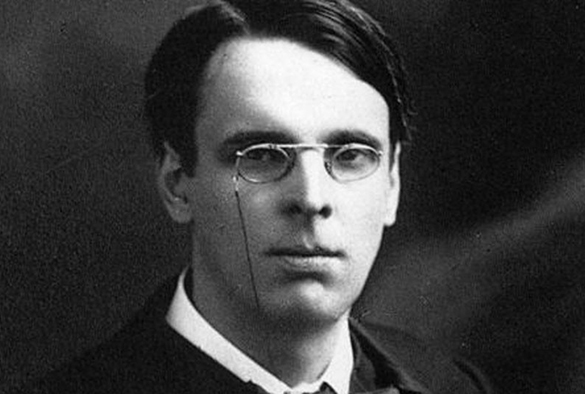
Dr Frank Shovlin is a Senior Lecturer in the University of Liverpool’s Institute of Irish Studies
“2015 has seen an extraordinary renewal of interest in the life and work of WB Yeats (1865-1939) as we commemorate the 150th anniversary of his birth. As part of these commemorations I have become a panellist on RTÉ Radio’s new three-part show ‘WB Yeats: Sex, Death and the State of the Nation’. My own involvement comes in Part Two where, alongside Prof Margaret Harper of University of Limerick and Prof Jim Flannery of Emory University, I discuss Yeats’s lifelong interest in and fascination with the esoteric.
Spirit world
For many readers of the poet’s work, this aspect of his life is the hardest to accept as he moved through every imaginable effort to see what lies behind this real and limited world we all inhabit to get through to a more profound, more magical and ultimately more satisfying version of what it is to be human. As such, Yeats was fascinated by folk and fairy tales, by the poetry of William Blake, by Eastern mysticism, by the Kabbalah, by Rosicrucianism and by an organization particularly dear to his heart, The Order of the Golden Dawn, which sought to contact the spirit world via a rich matrix of signs and symbols.
Perhaps Yeats’s greatest breakthrough into this other world came with his marriage to Georgie Hyde Lees in 1917, and the discovery that she was a seer who could contact the spirit realm and communicate with those phantasmal figures through her ‘automatic writing’.
Yeats took this phenomenon entirely seriously, and the many sessions of such writing led, ultimately, to the publication of his most important esoteric work, A Vision (1925). The radio show discusses how seriously we ought to take any or all of this, and points to the ways in which it is necessary to at least accept that Yeats was sincere in his pursuits, even where the typical reader may find it all rather farfetched.
Yeats was all too conscious of this public scepticism, even opprobrium, about his passion to reveal what lay behind ‘the trembling veil’, but stuck to his guns throughout his writing career. In one celebrated letter of 1892 he writes to John O’Leary — the old Fenian he so greatly admired but who was dismissive of his involvement with mystical societies — and expresses straightforwardly and unashamedly the significance of the supernatural to his work: “The mystical life is the centre of all that I do and all that I think and all that I write”.
“It is surely absurd”, he goes on, “to hold me ‘weak’ or otherwise because I chose to persist in a study which I decided deliberately four or five years ago to make, next to my poetry, the most important pursuit of my life.”
Mystical life
If we read a few lines further in that letter to O’Leary, we find a more grounded definition of what can be meant by ‘the mystical life’ that represents a closer match to straightforward conceptions of the artistic imagination and how it has a bearing on the mysterious act of writing:
“I have always considered myself a voice of what I believe to be a greater renaissance — the revolt of the soul against the intellect — now beginning in the world.” And, as for magic, Yeats, while believing in it as a supernatural force, could also be quite clear eyed in his description of it as being simply “the visions of truth in the depths of the mind when the eyes are closed”.
This quest for truth, a startling and accurate revelation of what it is to be alive, to be human, is what lies at the heart of all worthwhile literary endeavour, and nobody succeeded in achieving it more fully than Yeats.
RTÉ Radio’s new three-part show ‘W. B. Yeats: Sex, Death and the State of the Nation’ broadcasts over successive Monday nights at 10pm between 7 and 21 September. Dr Frank Shovlin features in tonight’s episode.
